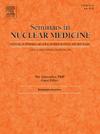The Evolution of Artificial Intelligence in Nuclear Medicine
IF 5.9
2区 医学
Q1 RADIOLOGY, NUCLEAR MEDICINE & MEDICAL IMAGING
引用次数: 0
Abstract
Nuclear medicine has continuously evolved since its beginnings, constantly improving the diagnosis and treatment of various diseases. The integration of artificial intelligence (AI) is one of the latest revolutionizing chapters, promising significant advancements in diagnosis, prognosis, segmentation, image quality enhancement, and theranostics. Early AI applications in nuclear medicine focused on improving diagnostic accuracy, leveraging machine learning algorithms for disease classification and outcome prediction. Advances in deep learning, including convolutional and more recently transformer-based neural networks, have further enabled more precise diagnosis and image segmentation as well as low-dose imaging, and patient-specific dosimetry for personalized treatment. Generative AI, driven by large language models and diffusion techniques, is now allowing the process, interpretation, and generation of complex medical language and images. Despite these achievements, challenges such as data scarcity, heterogeneity, and ethical concerns remain barriers to clinical translation. Addressing these issues through interdisciplinary collaboration will pave the way for a broader adoption of AI in nuclear medicine, potentially enhancing patient care and optimizing diagnosis and therapeutic outcomes.
人工智能在核医学中的发展。
核医学自诞生以来不断发展,不断提高各种疾病的诊断和治疗水平。人工智能(AI)的集成是最新的革命性章节之一,有望在诊断、预后、分割、图像质量增强和治疗方面取得重大进展。早期人工智能在核医学中的应用侧重于提高诊断准确性,利用机器学习算法进行疾病分类和结果预测。深度学习的进步,包括卷积和最近基于变压器的神经网络,进一步实现了更精确的诊断和图像分割,以及低剂量成像,以及个性化治疗的患者特异性剂量测定。由大型语言模型和扩散技术驱动的生成式人工智能现在可以处理、解释和生成复杂的医学语言和图像。尽管取得了这些成就,但诸如数据稀缺、异质性和伦理问题等挑战仍然是临床翻译的障碍。通过跨学科合作解决这些问题将为在核医学中更广泛地采用人工智能铺平道路,从而有可能加强患者护理并优化诊断和治疗结果。
本文章由计算机程序翻译,如有差异,请以英文原文为准。
求助全文
约1分钟内获得全文
求助全文
来源期刊

Seminars in nuclear medicine
医学-核医学
CiteScore
9.80
自引率
6.10%
发文量
86
审稿时长
14 days
期刊介绍:
Seminars in Nuclear Medicine is the leading review journal in nuclear medicine. Each issue brings you expert reviews and commentary on a single topic as selected by the Editors. The journal contains extensive coverage of the field of nuclear medicine, including PET, SPECT, and other molecular imaging studies, and related imaging studies. Full-color illustrations are used throughout to highlight important findings. Seminars is included in PubMed/Medline, Thomson/ISI, and other major scientific indexes.
 求助内容:
求助内容: 应助结果提醒方式:
应助结果提醒方式:


